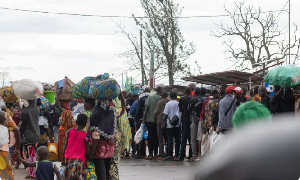Accra, Sept. 11, GNA - The University of Ghana on Tuesday introduced a significantly new dimension to the funding and management of tertiary education with the formal commencement of the construction of a 26 million-GH Cedi hostel complex to house students.
The 7,000-bed project is being financed from a syndicated loan by six Ghanaian financial institutions, an innovation President John Agyekum Kufuor said gave hope of serious awakening to institutional self-help among the country's universities.
Performing the ceremony to mark the formal commencement of construction work on the hostel and to inaugurate other new facilities, he noted that the universities were not lacking in terms of bankable and assets that could be invested, citing land, cash in the bank and ideas. "Strangely, this haven of innovativeness and resourcefulness has somehow seemed bereft of capacity to convert their assets in a business-like manner to grow themselves."
President Kufuor said it was heart-warming that at long last "an awakening is taking place on all campuses".
He conveyed the Government's gratitude to the six financial institutions - Cal Bank, Ecobank, Agricultural Development Bank, Fidelity Bank Ghana, International Commercial Bank and SG-SSB Ghana - for agreeing to provide credit for the hostel project. He said by so doing, they were contributing to the implementation of the Government's human resource development policy and also promoting the concept of public-private partnership as a cornerstone of the nation's socio-economic development.
Additionally, this was also a confirmation of the growing confidence in the national economy.
The new projects the President inaugurated were a computer laboratory, a recreational garden and phase one of a sports complex, consisting of an Olympic-size swimming pool, gymnasium and changing room.
President Kufuor said the Government, realizing that the ideal capacity of the university might be about 50,000 students within the next decade, was committed to supporting it to expand instructional, accommodation and staffing capacities.
This was being done through budgetary allocation as well as the GETFund.
Mr Anthony Oteng-Gyasi, Chairman of the University Council, asked the contractors to ensure that they delivered not only quality job but also did that within the scheduled timeframe of between 24 to 36 months. He said he was unhappy about the slow pace of work on leased lands by private developers, saying the relief they had hoped for had been painfully slow in coming.
Professor Clifford Nii Boi Tagoe, the Vice Chancellor, said they were doing everything to improve on academic, residential and recreational facilities at the University and expressed appreciation to the Government, the GETFund and some individuals for their support in this direction.
The President of the Students Representative Council, Ms Louise Carol Serwaa Donkor, while welcoming the hostel project, said there was the need for corresponding increase in academic facilities.
General News of Tuesday, 11 September 2007
Source: GNA












